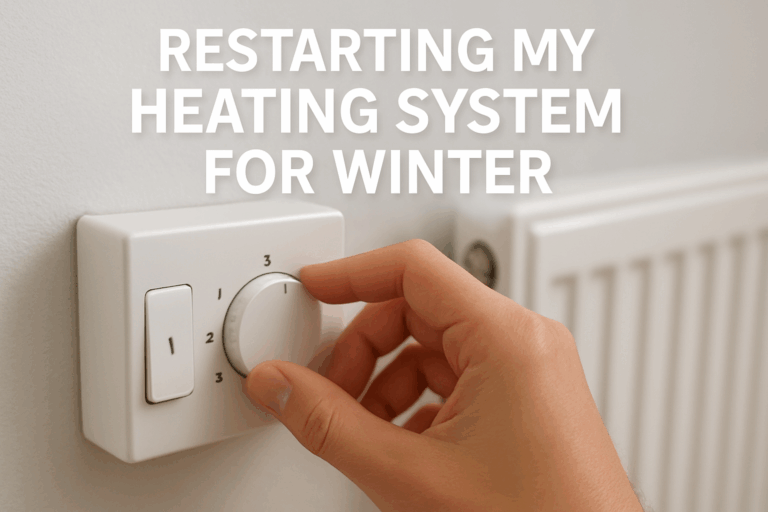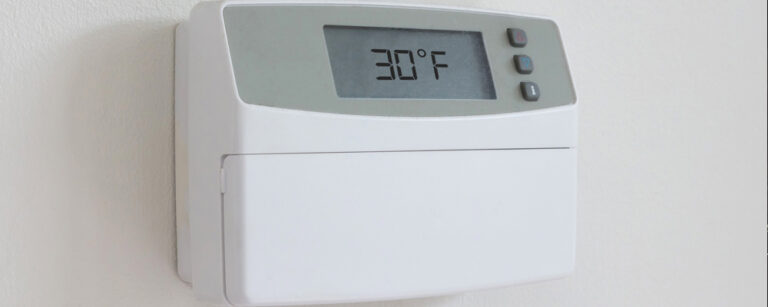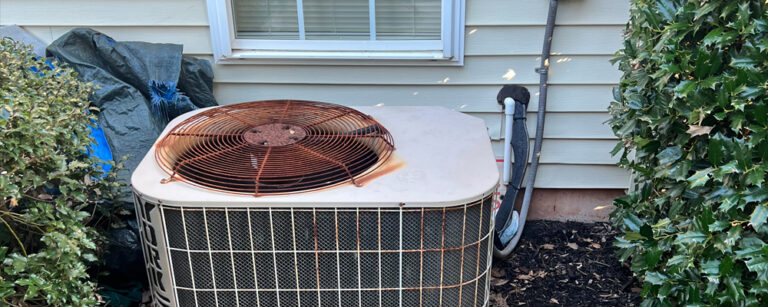Why Does My Heating System Smell Funny?

We’ll walk through the most common heating system odors, from burning and metallic smells that might signal overheating components to dangerous gas leaks that create rotten egg odors. You’ll also learn about air quality issues that cause musty smells and when strange odors coming from your vents actually have nothing to do with your furnace at all.
Understanding Common Heating System Odors
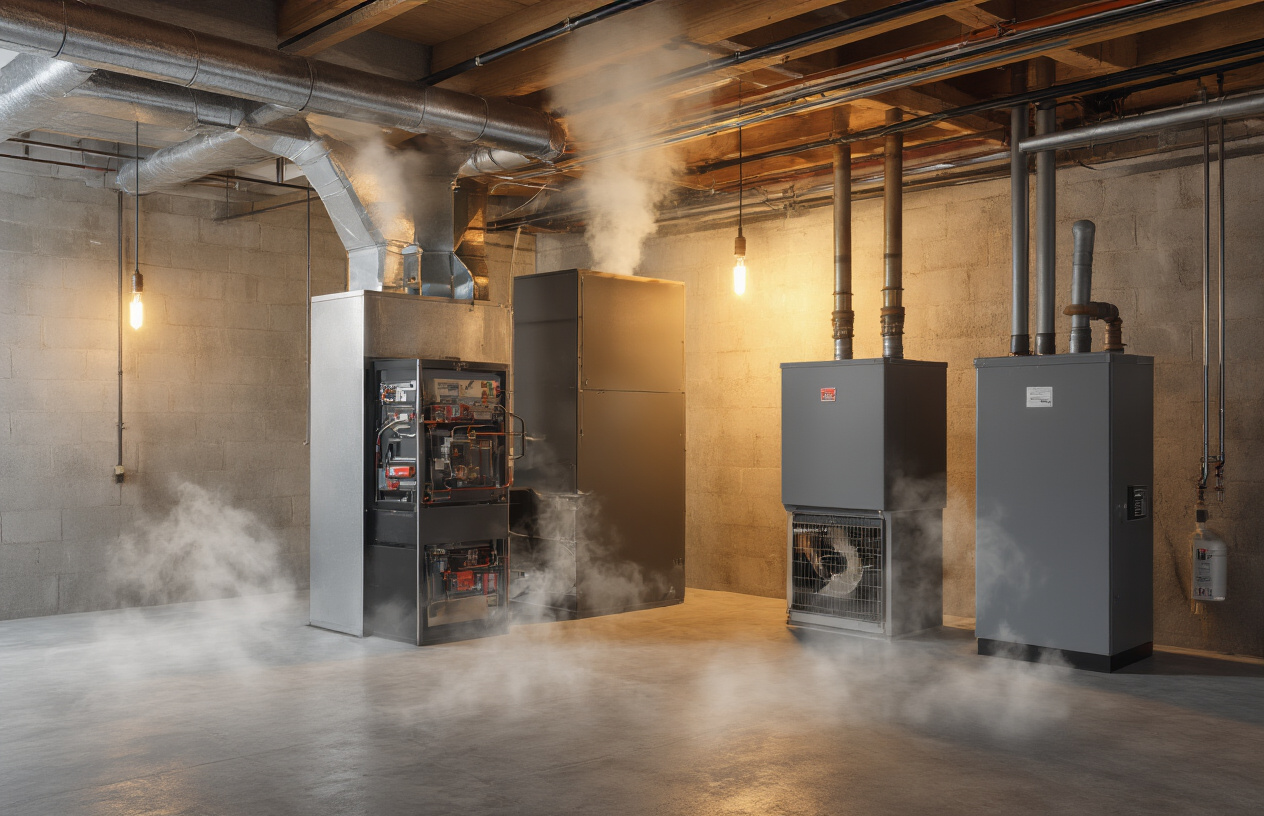
Normal vs. Concerning Smells
When your heating system first starts up after months of inactivity, certain odors are completely normal and expected. The most common normal smell is a burning dust odor that occurs when you turn on your furnace for the first time in the fall. During the spring and summer months, dust and debris naturally accumulate on internal components, including the burners and heat exchanger. When your furnace ignites to start heating, this dirt and dust burns off, flowing through the ductwork and into your home. This smell typically dissipates within a few minutes to a few hours and is not cause for concern.
However, lingering smells are concerning, since heating equipment is the second-highest cause of house fires. If burning odors persist beyond the initial startup period, this indicates potential overheating of the furnace or blower motor. Electrical burning smells, hot plastic odors, or burning plastic scents signal that wiring or components could be melting, which requires immediate attention.
Concerning smells that demand immediate action include sulfur or rotten egg odors, which indicate natural gas leaks, and metallic or chemical smells that could signal electrical problems or a cracked heat exchanger leaking carbon monoxide. Musty odors pointing to mold or mildew presence, and car exhaust smells suggesting venting problems are also serious concerns that require professional intervention.
When to Take Immediate Action
Certain furnace odors require immediate emergency response to protect your safety and prevent potentially life-threatening situations. If you detect a gas smell or rotten egg odor from your furnace, this indicates a significant natural gas leak. Gas companies add a sulfur-based chemical called mercaptan to create this distinctive smell as a safety precaution, since natural gas is naturally odorless, colorless, and tasteless.
When you smell gas or rotten eggs, turn off your gas supply via the shutoff valve if you can do this safely, then exit your house immediately and call 911 and your gas company. Do not use electrical switches, phones, or create any sparks that could ignite the gas. Exposure to natural gas can cause headache, dizziness, nausea, vomiting, eye irritation, nasal irritation, breathing issues, and skin rashes and blisters.
Another situation requiring immediate action is when your carbon monoxide detector goes off, even if you don’t smell anything unusual. Your furnace may be leaking carbon monoxide due to a cracked heat exchanger. Carbon monoxide is fatal in large doses and is colorless, tasteless, and odorless, making it extremely dangerous. In some instances, a chemical smell like formaldehyde can indicate heat exchanger failure.
Electrical burning smells, particularly those resembling melting plastic or hot metal, should prompt you to shut off your furnace immediately to prevent potential house fires. Most furnaces have safety features to shut down when overheating, but electrical or mechanical issues may prevent these safety features from working properly.
Safety Precautions for Strange Odors
When dealing with any unusual furnace odors, following proper safety precautions can prevent dangerous situations and protect your family’s health. The first and most important step is to never ignore persistent or concerning smells from your heating system. Trust your senses – if something smells wrong, it likely indicates a problem that needs professional attention.
For any electrical burning smells or persistent burning odors beyond normal dust burn-off, shut off your furnace immediately using the emergency switch or circuit breaker. This prevents potential overheating that could lead to component damage or house fires. Never attempt to diagnose or repair electrical issues yourself, as this requires specialized knowledge and tools.
Maintain working carbon monoxide detectors throughout your home, especially near sleeping areas and your furnace room. Test these detectors monthly and replace batteries as needed. Carbon monoxide exposure can be fatal, and early detection is crucial since this gas provides no natural warning signs.
Keep your furnace area clear of obstructions and stored items that could interfere with proper ventilation or create fire hazards. Ensure venting pipes remain free from blockages like snow, ice, or bird nests, which can cause dangerous gases to back up into your home.
Regular preventive maintenance is your best defense against dangerous odors. Annual professional inspections allow HVAC technicians to identify potential issues before they become serious problems. During these visits, technicians clean components, check for gas leaks, inspect heat exchangers, and ensure proper ventilation – all critical factors in preventing dangerous furnace odors.
Burning and Metallic Smells From Your Furnace
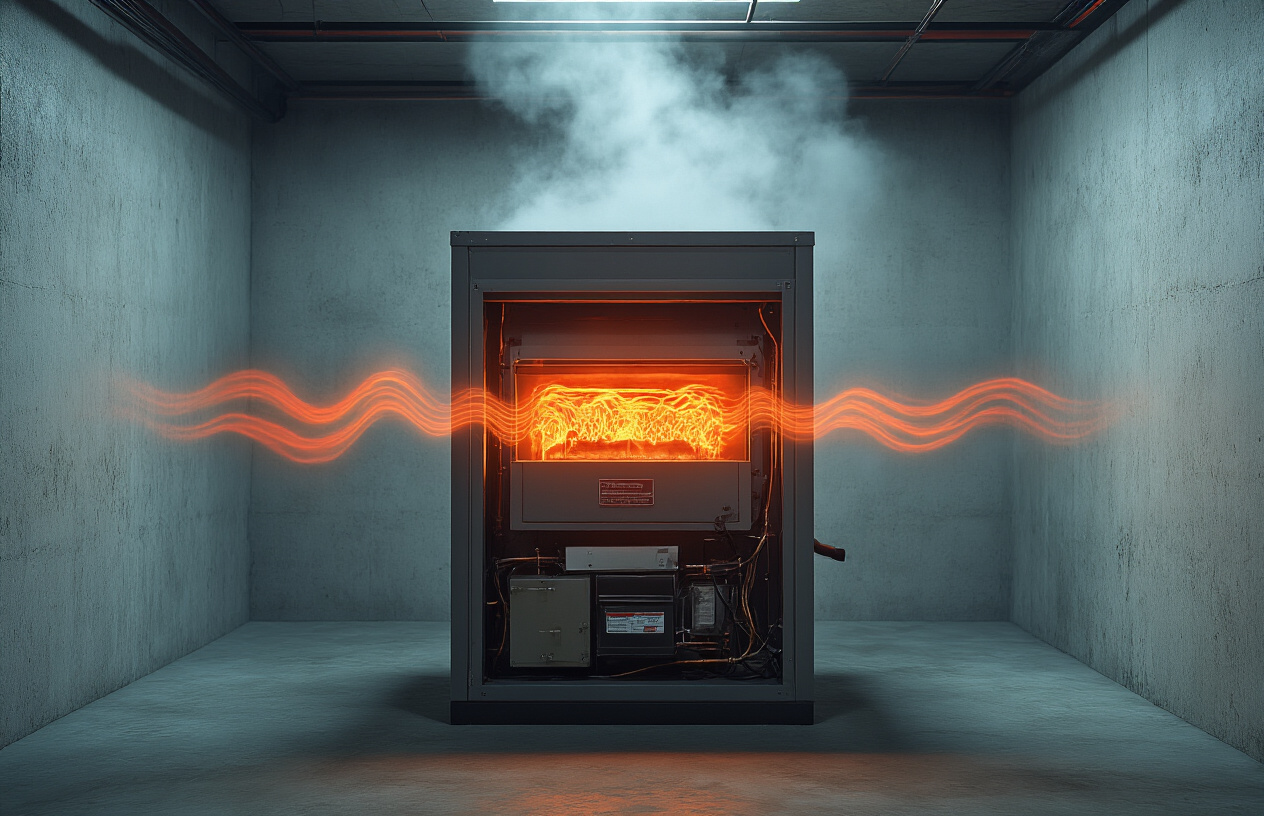
Normal Burning Dust at Season Start
When you turn on your furnace for the first time each heating season, it’s completely normal to detect a characteristic burning smell. During periods of inactivity, your HVAC system accumulates a fine layer of dust within the heat exchanger, ductwork, and on the ignition system. This dust buildup occurs naturally throughout the year as your system remains dormant during warmer months.
The burning odor you experience comes from this accumulated dust burning off as your furnace fires up and heats these components. This seasonal smell is typically unpleasant but harmless, and it shouldn’t last longer than an hour or significantly impact your indoor air quality. To help dissipate the odor more quickly, you can crack a window slightly to provide ventilation or turn on a bathroom exhaust fan to improve air circulation.
However, it’s important to distinguish between normal dust burning and problematic odors. If the burning smell persists beyond the initial startup period or becomes a recurring issue throughout the heating season, this could indicate a more serious underlying problem that requires professional attention.
Overheating Components and Electrical Issues
Now that we’ve covered normal seasonal burning smells, it’s crucial to understand when furnace odors signal more serious problems. Overheating components represent one of the most common causes of persistent burning smells in heating systems.
When your furnace filter becomes dirty or clogged, it restricts proper airflow throughout your system. This poor air movement forces your furnace to work harder, potentially causing components like the heat exchanger and blower motor to overheat. Additionally, blocked air return ducts can prevent cold air from circulating properly, trapping heat within the furnace and creating dangerous operating conditions.
Overheated furnaces often trigger internal limit switches designed to protect the system by shutting it down. However, repeated overheating cycles can cause severe damage, including cracking of the heat exchanger, which poses a carbon monoxide risk to your household.
Electrical issues present another serious concern when burning smells persist. Burning plastic odors specifically indicate potential problems with electrical connections within your HVAC system. When wire insulation becomes damaged due to physical trauma, improper voltage, or incorrect installation, it creates electrical faults that burn off the protective coating. This situation can even spark house fires, making immediate professional intervention essential.
When Burning Smells Signal Emergency Repairs
With this understanding of overheating and electrical issues in mind, it’s critical to recognize when burning smells require immediate emergency attention. Certain odor characteristics and accompanying symptoms indicate dangerous conditions that demand swift action.
A gunpowder or firework-like scent typically signals a fried circuit board or severely overheated fan motor. While this doesn’t pose an immediate safety hazard to occupants, it requires turning off your furnace immediately and calling an HVAC technician to prevent further system damage.
Burning plastic smells warrant even more urgent attention, as they often indicate electrical malfunctions that could lead to house fires. These odors may result from foreign objects like toys or utensils that have fallen into the system, overheating motors, or worn-out furnace parts causing plastic wire casings to melt.
If you detect persistent burning odors accompanied by any of the following warning signs, shut off your furnace immediately and contact emergency HVAC services:
- Burning smells that don’t dissipate within an hour of startup
- Recurring burning odors throughout the heating season
- Plastic or electrical burning smells at any time
- Visible smoke or sparks from the furnace
- Unusual noises combined with burning odors
- Frequent furnace shutdowns or cycling issues
Remember, electrical issues pose fire hazards that extend beyond your heating system, potentially threatening your entire home’s safety.
Gas Leaks and Rotten Egg Odors
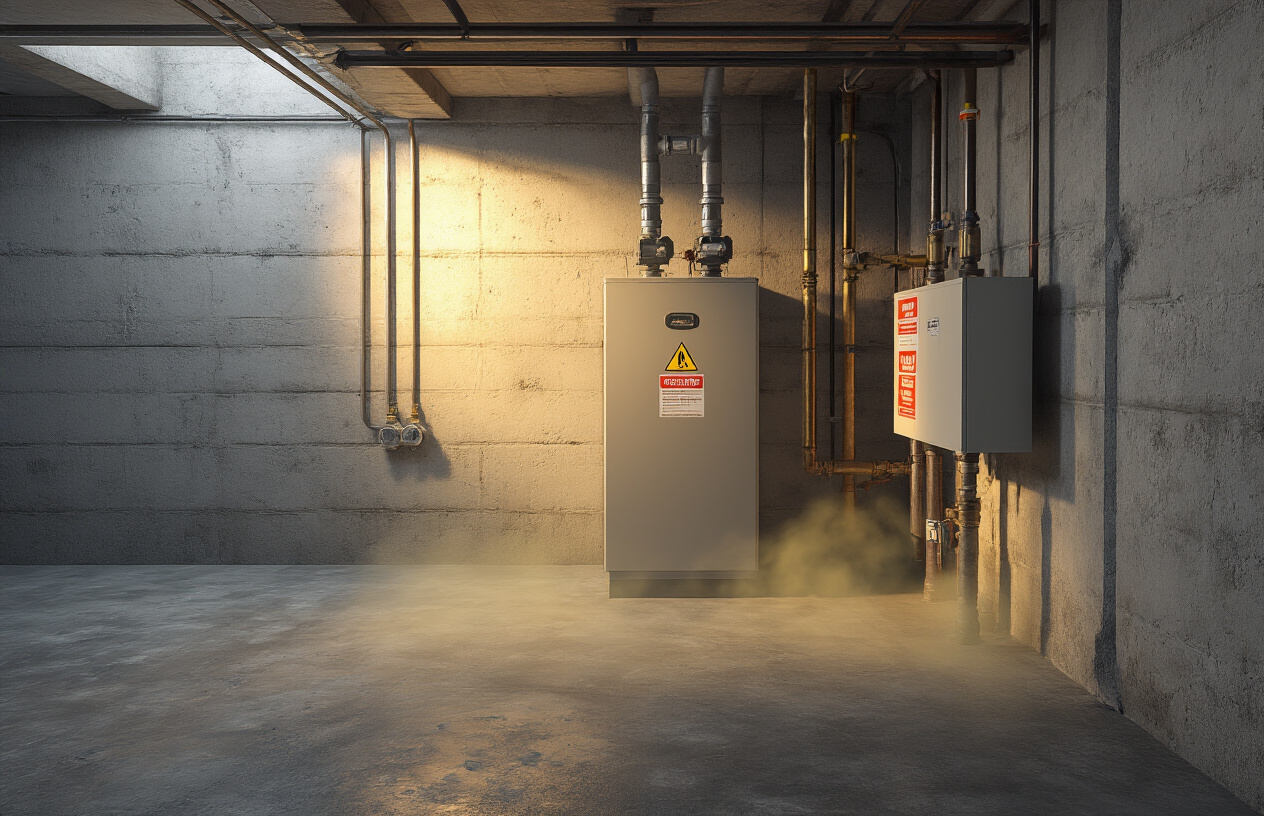
Recognizing Natural Gas Leak Warning Signs
Natural gas is naturally odorless and colorless, but utility companies add a distinct chemical additive that creates the characteristic “rotten egg” smell to help detect leaks. However, this scent can be difficult to detect, especially for those with a reduced sense of smell or while sleeping. The most obvious warning sign is this strong sulfur-like odor, but there are additional indicators to watch for around your heating system and home.
Beyond the distinctive smell, listen for unusual hissing or whistling sounds near gas appliances, which could indicate gas escaping from connections or pipes. Visual signs include dead vegetation around gas lines outside your home, dirt or dust blowing from underground gas lines, or a white cloud or mist near gas appliances. These physical manifestations often accompany gas leaks and require immediate attention.
Immediate Safety Steps and Emergency Response
When you suspect a natural gas leak, immediate action is critical to prevent potentially explosive conditions. First, avoid creating any sparks or flames – do not turn electrical switches on or off, light matches, use cell phones in the immediate area, or operate any electrical devices. Leave the area immediately and get fresh air.
Once you’re at a safe distance, call your gas utility company’s emergency line and 911 from outside your home. Do not re-enter the building until professionals have declared it safe. If possible, shut off the main gas valve if you can do so safely without going near the suspected leak area. Ensure all family members and pets evacuate the premises and wait for emergency responders to assess the situation.
Health Symptoms From Gas Exposure
Prolonged exposure to natural gas can cause various health symptoms that worsen over time. Early signs include headaches, dizziness, fatigue, and nausea. As exposure continues, individuals may experience difficulty breathing, chest pain, and reduced oxygen levels in the blood.
More severe symptoms include loss of consciousness, memory problems, and in extreme cases, asphyxiation due to oxygen displacement. Children, elderly individuals, and those with respiratory conditions are particularly vulnerable to gas exposure effects. Even brief exposure can cause these symptoms, which is why immediate evacuation and professional assessment are essential when gas leaks are suspected. These health risks underscore the importance of installing natural gas detectors as an additional safety measure, since they can provide early warning before dangerous levels accumulate.
Air Quality Issues and Musty Odors
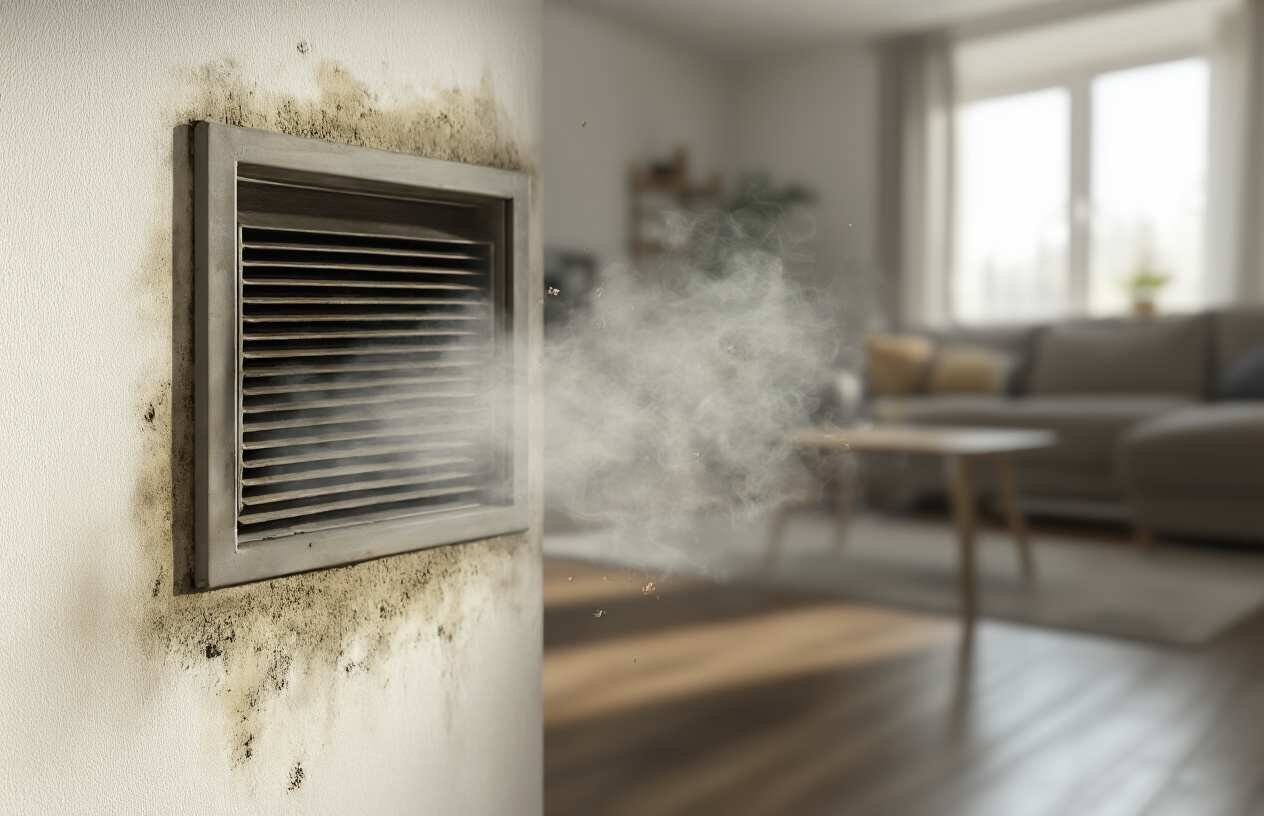
Mold and Mildew in Ductwork
When your heating system circulates air through contaminated ductwork, musty odors can quickly permeate your entire home. Mold and mildew growth in air ducts creates a perfect breeding ground for harmful bacteria that gets distributed throughout your living space every time your system operates.
Leaky ductwork is one of the primary culprits behind mold development. These openings allow humid air to enter what should be a sealed system, creating excessive condensation inside the ductwork. This moisture-rich environment provides ideal conditions for mold and mildew growth. The problem becomes more severe when these leaks go undetected for extended periods, allowing bio-growth to establish itself throughout the entire duct system.
Standing water from cracked or overflowing drain pans can also contribute to mold issues. When condensation doesn’t drain properly, it creates pools of moisture that allow mold and mildew to thrive. Your heating system then picks up these musty scents and circulates them through your home’s air supply.
If you notice visible mold at registers or return air vents, this indicates a more serious problem requiring professional assessment. HVAC technicians use special equipment to thoroughly inspect ductwork for mold contamination. When mold is discovered, certified professionals from the National Air Duct Cleaners Association (NADCA) should perform comprehensive cleaning of the entire HVAC system, not just the visible ductwork.
Clogged Filters Causing Dusty Smells
Air filters play a crucial role in maintaining healthy indoor air quality, but when they become clogged with dirt, dust, and other contaminants, they can become sources of unpleasant odors themselves. A dirty filter that hasn’t been changed in several months transforms from a protective barrier into a breeding ground for bacteria and bio-growth.
Clogged filters restrict airflow throughout your heating system, creating multiple problems beyond just dusty smells. Reduced airflow can cause your evaporator coil to freeze and decrease your system’s overall efficiency. More importantly for odor issues, restricted airflow increases humidity levels in your home, creating conditions where harmful bacteria can multiply more rapidly.
During humid months, a dirty filter becomes particularly problematic as it traps moisture along with dust and debris. This combination of moisture and organic material provides perfect conditions for mold and mildew development right within the filter itself. When your heating system operates, air passes through this contaminated filter, picking up musty scents that then get distributed throughout your home.
The solution is straightforward but requires consistency: filters should be changed every one to three months, depending on usage and environmental conditions. If you discover your filter is wet rather than just dirty, this indicates a more serious moisture problem that requires professional investigation. A wet filter should never occur in a properly functioning system.
Moisture Problems and Damp Odors
Excessive moisture in your heating system creates multiple pathways for unpleasant damp odors to develop. When your system’s location lacks proper humidity control, such as in basements, attics, or crawlspaces, temperature and humidity fluctuations create ideal conditions for bio-growth development.
Poor air circulation significantly contributes to moisture problems. When supply and return vents are blocked by furniture or other items, airflow becomes restricted around your heating unit. This restriction prevents proper humidity regulation throughout your home and creates stagnant areas where moisture can accumulate. Many homes lack adequate return vents, which compounds this circulation problem and leads to increased humidity levels that promote bacterial growth.
Whole-house humidifiers, when not properly maintained, can become sources of moisture-related odors. These systems work in conjunction with your heating unit to distribute water throughout the ductwork. However, residual or standing water from poorly maintained humidifiers can cause bio-growth and harmful bacteria to circulate throughout your entire system.
The location of your heating system also affects moisture control. Units installed in areas without proper temperature regulation face constant challenges with humidity management. Without return vents to regulate air humidity in these spaces, airflow becomes immediately restricted around the unit, causing problems with temperature control and creating environments where damp odors can flourish.
Professional assessment becomes necessary when moisture problems persist despite basic maintenance efforts. Sealing leaky ducts, improving ventilation, and addressing humidity control issues require specialized knowledge and equipment to ensure long-term resolution of damp odor problems.
Dangerous Chemical and Exhaust Smells
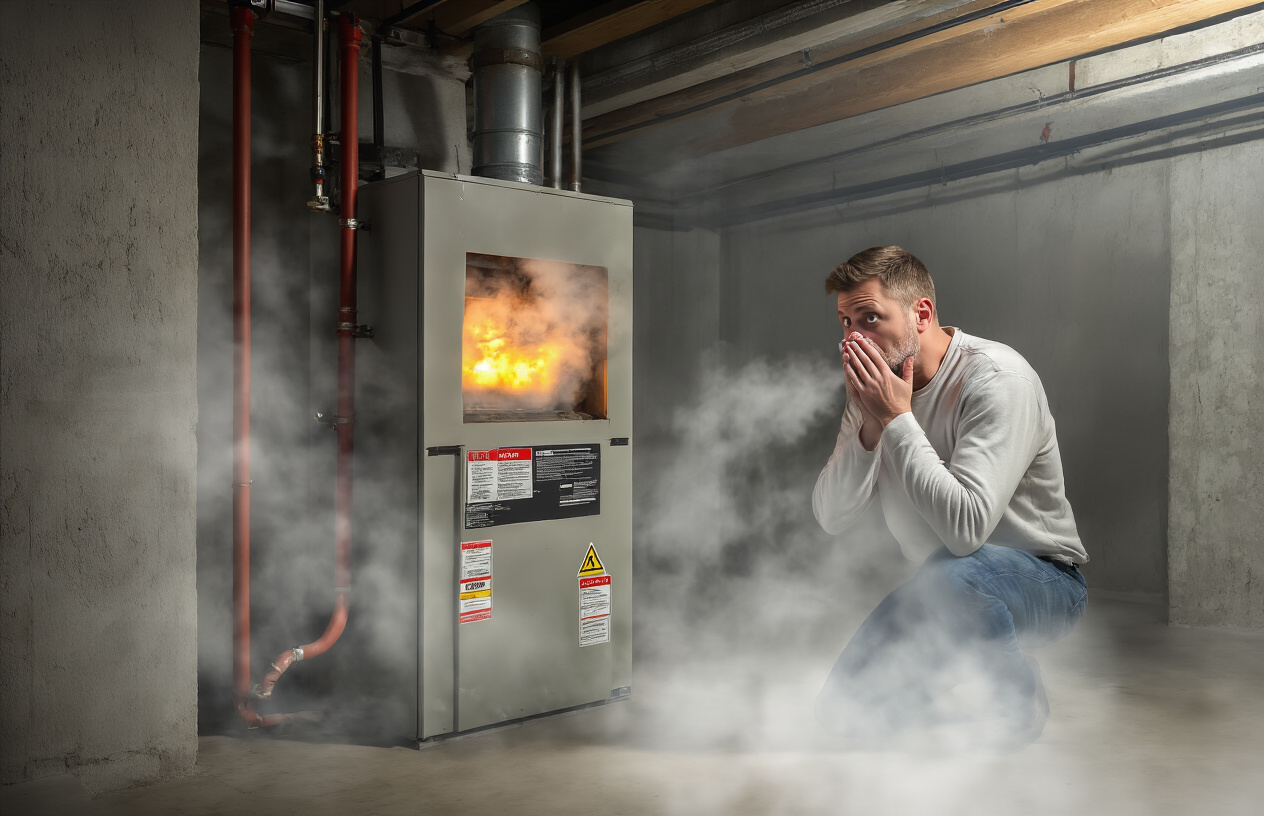
Heat Exchanger Cracks and Formaldehyde Odors
With this in mind, one of the most dangerous situations involving your heating system occurs when the heat exchanger develops cracks. The heat exchanger acts as a critical barrier between the combustion process and the air circulating throughout your home. When your furnace burns natural gas to generate heat, it produces combustion fumes that must be safely contained and vented outdoors.
Over time, the metal of your heat exchanger undergoes constant heating and cooling cycles, causing it to expand and contract repeatedly. This process gradually weakens the metal, making it brittle and more susceptible to cracking. When cracks develop, harmful combustion products can escape and mix with your home’s air supply.
You might notice a strong, chemical-like smell coming from your furnace when the heat exchanger is compromised. This odor indicates that dangerous gases are entering your living space instead of being safely vented outside. Additionally, soot buildup inside your furnace can signal incomplete combustion due to a broken heat exchanger, creating hazardous conditions in your home.
Carbon Monoxide Risks and Detection
Now that we’ve covered heat exchanger problems, the most serious concern is carbon monoxide (CO) exposure. Carbon monoxide is an odorless, colorless gas produced during the combustion process that can cause lethal poisoning. When a cracked heat exchanger allows CO to enter your home, it can go completely undetected without proper monitoring equipment.
Low levels of carbon monoxide exposure cause symptoms including headaches, shortness of breath, and nausea. However, high concentrations can be fatal within minutes, making this an extremely dangerous situation requiring immediate action.
Several warning signs indicate potential carbon monoxide leaks from your heating system. If your carbon monoxide detector sounds an alarm, immediately evacuate everyone from your home and call emergency services. Other indicators include your furnace suddenly stopping airflow due to safety shutoffs, flame color changing from blue to yellow when oxygen enters the combustion chamber, and unusual banging, whistling, or scraping sounds from your furnace.
If you suspect carbon monoxide issues, turn off your furnace and gas valve immediately to stop combustion and prevent worsening leaks. Check that your CO detector is functioning properly and showing zero readings before allowing anyone to remain in the house.
Blocked Vents and Exhaust Problems
Previously, I’ve mentioned how proper venting is essential for safe furnace operation. Your furnace relies on a sealed system that safely directs combustion gases outdoors through dedicated venting and flue systems. When these exhaust pathways become blocked or compromised, dangerous gases can back up into your living space.
Blocked vents and flues prevent harmful combustion products from escaping your home as designed. Dirt, debris, or other obstructions in these critical pathways can cause exhaust problems that create immediate safety hazards. Keep all vents and flues clear to ensure proper airflow and safe operation of your heating system.
Professional HVAC technicians can identify and address exhaust problems during routine inspections. They examine the entire venting system to ensure combustion gases are being properly expelled from your home. This preventative approach helps avoid dangerous situations before they develop into serious health and safety risks for your household.
Non-Furnace Related Odors
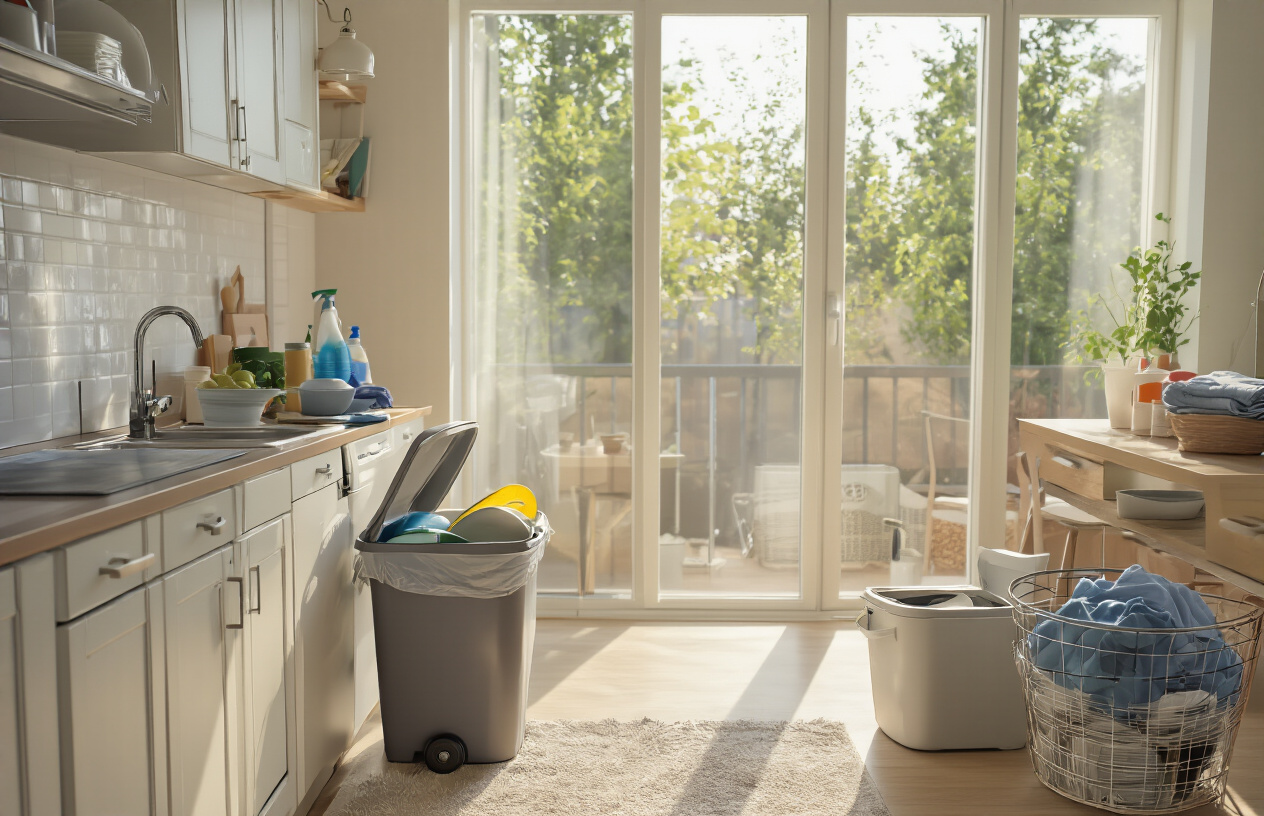
Pet Waste Near Floor Vents
Pet owners often overlook how their furry companions can contribute to unpleasant odors emanating from their heating systems. Pet dander and hair are common culprits that accumulate in residential ductwork, creating persistent circulation of these contaminants throughout your home. When pets have accidents near floor vents or return air grilles, the waste materials can be drawn directly into the HVAC system’s airflow.
The problem becomes more serious when pet waste dries and becomes airborne particles that get sucked into the ductwork. These organic materials can create breeding grounds for bacteria and contribute to musty, unpleasant odors that seem to come from your heating vents. Dogs and cats naturally shed fur and dander continuously, and these particles can clog up ductwork over time, especially in homes with multiple pets or during seasonal shedding periods.
Regular vacuuming around floor vents and maintaining clean areas near air intakes can help minimize this contamination source. Pet owners should pay special attention to keeping litter boxes, pet bedding, and feeding areas away from return air vents to prevent drawing these odors into the system.
Sewage Line Issues
Now that we’ve addressed pet-related contamination, sewage line problems represent another serious non-furnace source of foul odors that can affect your heating system. When sewage lines develop leaks or blockages near ductwork installations, the resulting gases and moisture can infiltrate your HVAC system through various pathways.
Sewage gases contain harmful compounds that create distinctly unpleasant smells reminiscent of rotten eggs or decaying organic matter. These odors can be drawn into your heating system through compromised duct seals, especially in basement installations where both sewage lines and ductwork are commonly located. The problem becomes particularly noticeable when your heating system operates, as the forced air circulation distributes these contaminated odors throughout your entire home.
Water leaks from damaged sewage lines can also create moisture problems in areas surrounding your ductwork. This excess moisture provides ideal conditions for mold and mildew growth, which can then colonize your HVAC system and create additional air quality issues. The combination of sewage gases and microbial growth creates a complex contamination scenario that requires immediate professional attention to prevent health risks and system damage.
External Contamination Sources
With this in mind, external contamination sources represent a significant category of non-furnace odors that can infiltrate your heating system from the surrounding environment. Your HVAC system can pull outdoor pollutants directly into your home, including everything from manufacturing exhaust and carbon soot to various airborne chemicals and particles.
Buildings located near industrial facilities, busy roadways, or commercial operations are particularly susceptible to external contamination. For example, structures adjacent to bus depots may experience systems filled with black soot from vehicle exhaust. Similarly, facilities near manufacturing plants can draw in specific industrial contaminants that create unique odor profiles when circulated through residential heating systems.
The building envelope plays a crucial role in preventing external contamination. When there are gaps, cracks, or improperly sealed areas in your home’s exterior, outdoor contaminants can infiltrate the structure and subsequently enter the HVAC system. This contamination pathway is particularly problematic because it introduces pollutants that bypass your system’s filtration, allowing them to circulate freely throughout your living spaces.
Outdoor contaminants can include pollen during allergy seasons, dust from construction activities, smoke from nearby fires, and chemical vapors from neighboring properties. These external sources often create intermittent odor problems that may seem to appear and disappear based on wind patterns, weather conditions, and seasonal factors. Proper sealing of the building envelope and regular inspection of potential infiltration points are essential for preventing these external contamination sources from affecting your indoor air quality.
When to Call Professional HVAC Services
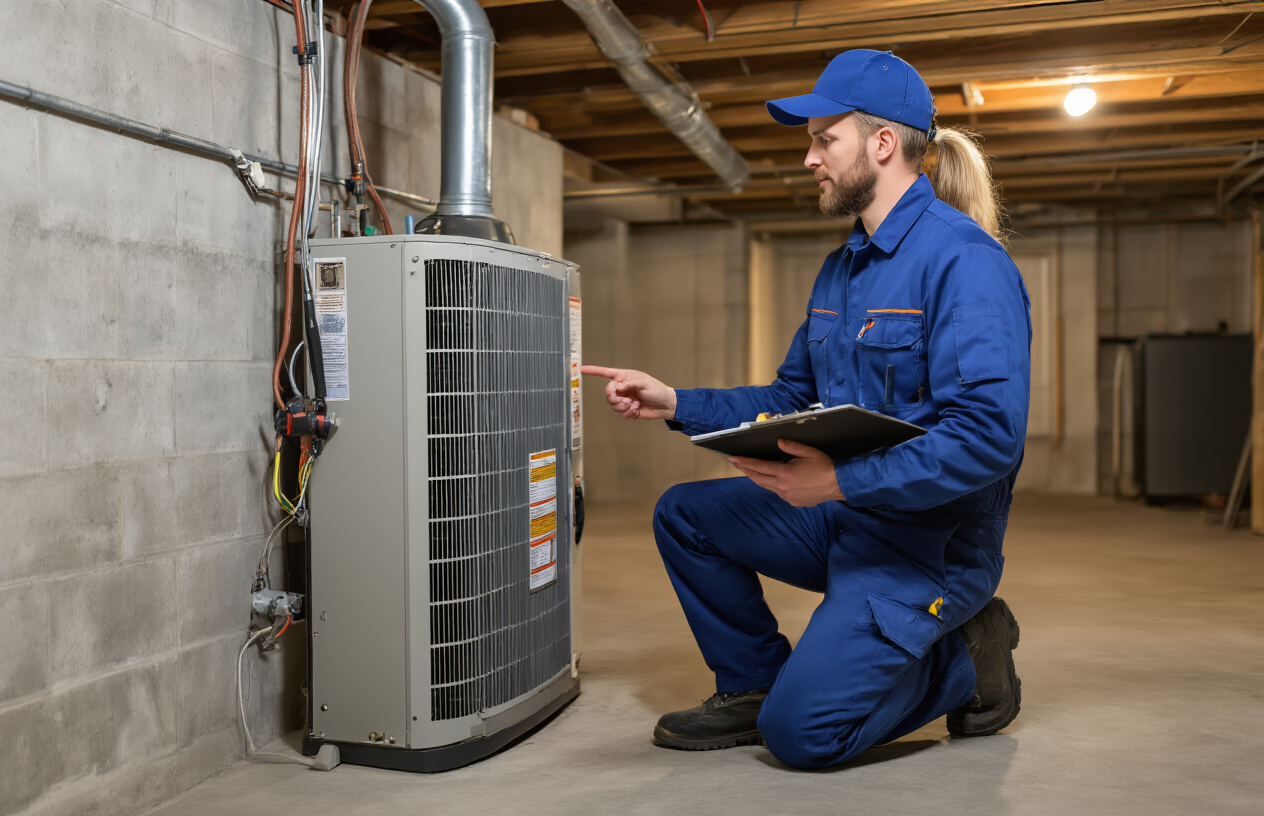
Signs Requiring Immediate Technician Response
Certain heating system odors demand immediate professional attention to prevent serious safety hazards or system damage. When you notice unusual noises or odors from your furnace or air conditioner, do not ignore these warning signs, as they often indicate loose parts, electrical issues, or faulty combustion that could escalate into emergencies.
Gas-related smells, particularly rotten egg odors, require immediate evacuation and professional response. Similarly, strong chemical smells or exhaust odors signal dangerous conditions that need urgent technician intervention. Poor indoor air quality symptoms, including persistent dust, unusual humidity levels, or inconsistent comfort, indicate potential HVAC performance problems requiring professional diagnosis.
Additional emergency signs include your system ignoring thermostat settings, insufficient airflow from vents, and loud, out-of-place sounds like bangs, growls, or rattling. If your heating system produces warm air instead of heat, experiences frequent on-off cycling, or shows rising energy bills without explanation, these symptoms warrant immediate professional assessment to prevent complete system breakdown.
Preventive Maintenance Benefits
Now that we’ve covered emergency situations, regular professional maintenance offers significant advantages in preventing odor-related issues and system failures. Professional maintenance and tune-ups help restore system efficiency, catching small issues early to keep your home comfortable while extending your system’s lifespan and saving money long-term.
Routine inspections can detect problems like poor airflow, duct leaks, or thermostat malfunctions before they become serious damage. Regular duct cleaning, air filter changes, and system check-ups significantly improve indoor air quality while ensuring proper ventilation throughout your home.
Professional technicians can identify short cycling issues, slow starts, or motor problems during scheduled maintenance visits. This proactive approach prevents minor hiccups from turning into major emergencies, avoiding the inconvenience of unexpected breakdowns during peak heating seasons.
Repair vs. Replacement Decisions
With maintenance benefits in mind, determining whether to repair or replace your heating system depends on several factors that professional HVAC technicians can help evaluate. If your HVAC system is over 10 years old and frequently requires repairs, replacement becomes more cost-effective than continued repairs.
However, if your heating system is younger and the repair addresses minor issues like clogged air filters, refrigerant leaks, or debris-covered components, professional repair represents the better investment. HVAC experts can diagnose complex problems involving compressors, condensers, or electrical components that require specialized knowledge and tools.
Professional technicians provide honest assessments of repair costs versus replacement benefits, considering factors like energy efficiency improvements, long-term reliability, and warranty coverage. While homeowners can perform basic tasks like changing air filters or keeping outdoor units debris-free, refrigerant level checks and electrical component repairs require certified professional expertise to ensure safety and proper system operation.
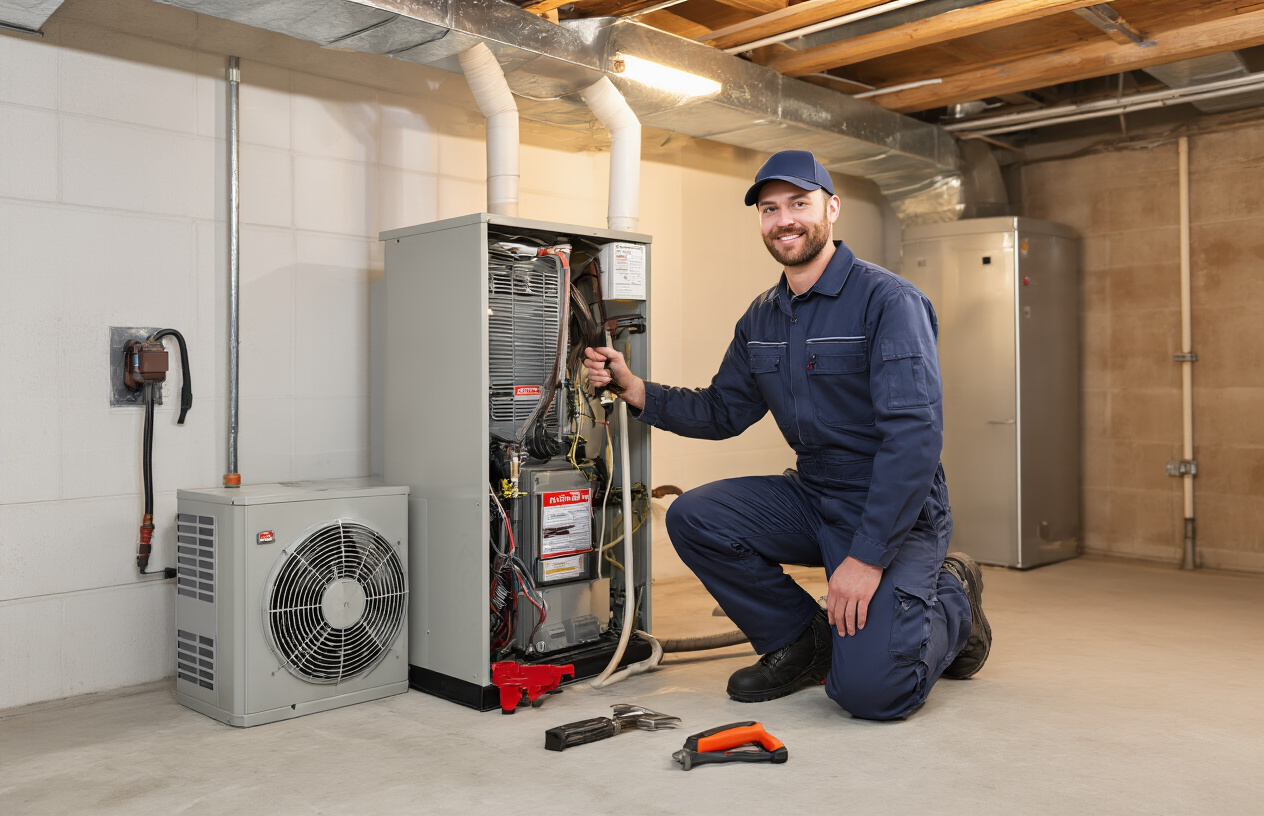
Strange odors from your heating system should never be ignored, as they often signal potential safety hazards or mechanical problems that require immediate attention. From the normal burning dust smell when first turning on your furnace to the dangerous rotten egg odor indicating a gas leak, each smell tells a story about your system’s condition. While some odors like initial dust burning are harmless and temporary, others such as metallic burning smells, chemical odors, or exhaust fumes can indicate serious issues ranging from overheating components to cracked heat exchangers that could lead to carbon monoxide exposure.
The key to protecting your home and family is knowing when to act quickly and when to call for professional help. If you detect gas odors, chemical smells, or smoke coming from your heating system, shut off the unit immediately and contact emergency services or a qualified HVAC technician. For persistent musty odors, burning smells that don’t dissipate, or any unusual scents that concern you, schedule a professional inspection promptly. Regular maintenance and filter changes can prevent many odor-related issues, but when problems do arise, addressing them quickly with professional HVAC services ensures your heating system operates safely and efficiently throughout the season.
Share Your New Knowledge
Why Choose Us?
- EPA Section 608 Certified: Type I, Type II, Type III, Universal
- NJ Master HVAC Contractor License
- R410A Safety Certified
- Over 15 Years of Experience
- Professional & Reliable
- Satisfaction Guaranteed

